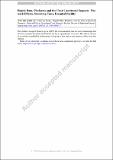| dc.contributor.author | Tucker, Catherine | |
| dc.date.accessioned | 2021-09-20T17:17:22Z | |
| dc.date.available | 2021-09-20T17:17:22Z | |
| dc.date.issued | 2019-02-13 | |
| dc.identifier.uri | https://hdl.handle.net/1721.1/131509 | |
| dc.description.abstract | Abstract
This paper asks whether the large amounts of digital data that are typically observed on large technology platforms—such as Google, Facebook, Uber and Amazon—typically give rise to structural conditions that would lead to antitrust concerns. In particular, I evaluate whether digital data augments or decreases concerns with regard to network effects and switching costs. I also evaluate whether data should be thought of as an ‘essential facility’. | en_US |
| dc.publisher | Springer US | en_US |
| dc.relation.isversionof | https://doi.org/10.1007/s11151-019-09693-7 | en_US |
| dc.rights | Creative Commons Attribution-Noncommercial-Share Alike | en_US |
| dc.rights.uri | http://creativecommons.org/licenses/by-nc-sa/4.0/ | en_US |
| dc.source | Springer US | en_US |
| dc.title | Digital Data, Platforms and the Usual [Antitrust] Suspects: Network Effects, Switching Costs, Essential Facility | en_US |
| dc.type | Article | en_US |
| dc.contributor.department | Sloan School of Management | |
| dc.eprint.version | Author's final manuscript | en_US |
| dc.type.uri | http://purl.org/eprint/type/JournalArticle | en_US |
| eprint.status | http://purl.org/eprint/status/PeerReviewed | en_US |
| dc.date.updated | 2020-09-24T21:26:33Z | |
| dc.language.rfc3066 | en | |
| dc.rights.holder | Springer Science+Business Media, LLC, part of Springer Nature | |
| dspace.embargo.terms | Y | |
| dspace.date.submission | 2020-09-24T21:26:33Z | |
| mit.metadata.status | Authority Work and Publication Information Needed | |
